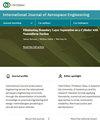A Sparse CoSaMP Channel Estimation Algorithm With Adaptive Variable Step Size for an OFDM System
IF 1.2
4区 工程技术
Q3 ENGINEERING, AEROSPACE
引用次数: 0
Abstract
Compressive sampling matching pursuit (CoSaMP), as a conventional algorithm requiring system sparsity and sensitive to step size, was improved in this paper by approximating the sparsity with adaptive variable step size. In the proposed algorithm (CoSaMP with variable step size abbreviated as Vss-CoSaMP), the idea of approximating sparsity with adaptive step size was borrowed from the sparsity adaptive matching pursuit (SAMP) algorithm to determine the sparsity for the CoSaMP algorithm. The applicability of the CoSaMP algorithm was therefore expanded considerably. On this basis, a step size reduction was added as the iteration termination condition of an orthogonal frequency division multiplexing (OFDM) system. An adaptive variable step size algorithm was then put forward to address the CoSaMP algorithm’s sensitivity to step size. It could realize the required precision at different initial step sizes. A simulation was carried out to analyze the influence of pilot number and step size in an OFDM system on the algorithm. The algorithms, including SAMP, CoSaMP, and Vss-CoSaMP, were compared with two sparse channels, revealing that the Vss-CoSaMP algorithm overcame the problem of the CoSaMP algorithm, that is, the impossibility to forecast the channel sparsity. With the adaptive step size, the proposed algorithm could reach and achieve better accuracy than the CoSaMP algorithm. Additionally, the proposed algorithm was superior over the SAMP algorithm in terms of reconstruction, mean square error (MSE), and bit error ratio (BER).适用于 OFDM 系统的具有自适应可变步长的稀疏 CoSaMP 信道估计算法
压缩采样匹配追求(CoSaMP)是一种需要系统稀疏性且对步长敏感的传统算法,本文通过自适应可变步长近似稀疏性对其进行了改进。在所提出的算法(步长可变的 CoSaMP,缩写为 Vss-CoSaMP)中,利用自适应步长近似稀疏性的思想借鉴了稀疏性自适应匹配追求(SAMP)算法,以确定 CoSaMP 算法的稀疏性。因此,CoSaMP 算法的适用范围大大扩展。在此基础上,增加了步长减小作为正交频分复用(OFDM)系统的迭代终止条件。随后,针对 CoSaMP 算法对步长的敏感性,提出了一种自适应可变步长算法。它可以在不同的初始步长下实现所需的精度。仿真分析了 OFDM 系统中先导数和步长对算法的影响。在两个稀疏信道中比较了 SAMP、CoSaMP 和 Vss-CoSaMP 算法,发现 Vss-CoSaMP 算法克服了 CoSaMP 算法的问题,即无法预测信道稀疏性。通过自适应步长,提出的算法可以达到比 CoSaMP 算法更好的精度。此外,在重建、均方误差(MSE)和误码率(BER)方面,所提出的算法优于 SAMP 算法。
本文章由计算机程序翻译,如有差异,请以英文原文为准。
求助全文
约1分钟内获得全文
求助全文
来源期刊

International Journal of Aerospace Engineering
ENGINEERING, AEROSPACE-
CiteScore
2.70
自引率
7.10%
发文量
195
审稿时长
22 weeks
期刊介绍:
International Journal of Aerospace Engineering aims to serve the international aerospace engineering community through dissemination of scientific knowledge on practical engineering and design methodologies pertaining to aircraft and space vehicles.
Original unpublished manuscripts are solicited on all areas of aerospace engineering including but not limited to:
-Mechanics of materials and structures-
Aerodynamics and fluid mechanics-
Dynamics and control-
Aeroacoustics-
Aeroelasticity-
Propulsion and combustion-
Avionics and systems-
Flight simulation and mechanics-
Unmanned air vehicles (UAVs).
Review articles on any of the above topics are also welcome.
 求助内容:
求助内容: 应助结果提醒方式:
应助结果提醒方式:


